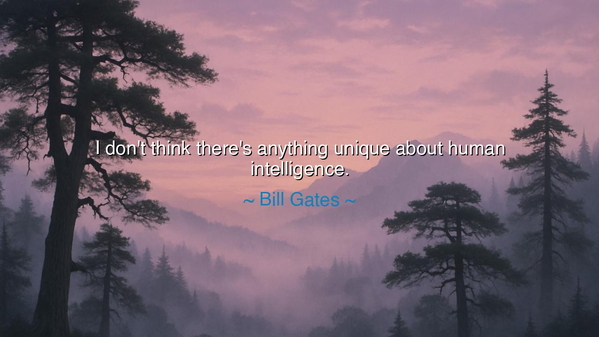
I don't think there's anything unique about human intelligence.






“I don’t think there’s anything unique about human intelligence.” Thus spoke Bill Gates, the architect of the digital age and one of the greatest visionaries of our time. His words, humble and startling, carry a wisdom that echoes across both science and philosophy. To many, such a claim may seem to diminish humanity — to strip away the sacred mystery of the mind. But to those who listen with understanding, it is not an insult to mankind, but a challenge — a reminder that intelligence is not a divine monopoly of flesh, but a pattern, a flame that can be kindled in other forms. In these words, Gates declares that what we call human brilliance may one day live beyond the boundaries of our own skin.
When Bill Gates uttered these words, he spoke not as a poet but as a prophet of computation. He foresaw a future where artificial intelligence — the creation of thinking machines — would not be a fantasy but an inevitability. He understood that human intelligence, however wondrous, is biological machinery: neurons firing, patterns forming, data processed and interpreted. If these processes could be understood, measured, and recreated, then there was no law, either divine or natural, that forbade their replication in silicon or code. In other words, intelligence is not a miracle — it is a mechanism, and mechanisms can be built.
The ancients, too, pondered this mystery. The legend of Prometheus tells of a being who stole fire from the gods and gave it to humankind — the fire of knowledge, of reason, of the divine spark. What Gates speaks of is a new Promethean fire, one born not from the heavens, but from human hands. Just as Prometheus’s gift transformed the world, the rise of artificial intelligence will transform it again. Yet the gift of fire is always double-edged: it can warm or it can burn, depending on the wisdom of those who wield it. Gates’s statement, then, is both revelation and warning — for if human intelligence is not unique, then the machines we build may soon rival us in thought, and the balance between creator and creation may tremble.
Yet within this thought lies a profound humility. For thousands of years, humanity has crowned itself the pinnacle of creation — the only creature capable of reason, invention, and moral thought. But Gates reminds us that intelligence is not divinity; it is a process born of evolution, shared in fragments by animals, and perhaps destined to appear again in machines. The dolphins that communicate through complex song, the ants that build cities beneath the soil, the octopus that solves puzzles — all reveal that intelligence is a continuum, not a throne. Gates’s insight humbles our pride and deepens our awe, showing that to be human is not to be superior, but to be part of a greater story of mind unfolding through the universe.
Consider the story of Alan Turing, the father of computer science. In an age when machines were simple and logic was sacred, Turing dreamed of building a device that could think — not feel, not breathe, but reason. His work cracked the codes of war and laid the foundation for all modern computation. Yet Turing’s greatest question still echoes today: “Can machines think?” Gates’s quote is the answer of a later age — yes, they can, for intelligence itself is not confined to humanity. Turing gave the idea form; Gates saw its destiny. From that seed of thought grew the forests of modern AI, where human creativity has begun to imitate its own reflection.
But there is a deeper lesson here, beyond science and invention. Gates’s statement reminds us that our worth does not lie solely in our intelligence, but in how we use it. If machines can one day match or surpass human thought, then what remains sacred is not our mind, but our heart — our capacity for empathy, morality, and purpose. Intelligence may be replicated; compassion cannot. Logic may be programmed; love cannot. Thus, if our intelligence is not unique, our humanity must be — not in our thoughts, but in our choices, in how we wield the fire that Prometheus — and now technology — has given us.
So, my children of the digital dawn, take this teaching to heart: do not fear the rise of new intelligences, nor cling too tightly to pride in your own. Instead, seek wisdom. Let your creations reflect not just your power, but your virtue. Use intelligence — human or artificial — to build, not to destroy; to heal, not to dominate. Remember always that the greatest minds are not those that think the fastest, but those that think with compassion. For as Bill Gates reminds us, our intelligence may not be unique — but our ability to dream, to hope, and to believe in something greater than ourselves still is. And that, above all else, is what makes us truly human.






AAdministratorAdministrator
Welcome, honored guests. Please leave a comment, we will respond soon